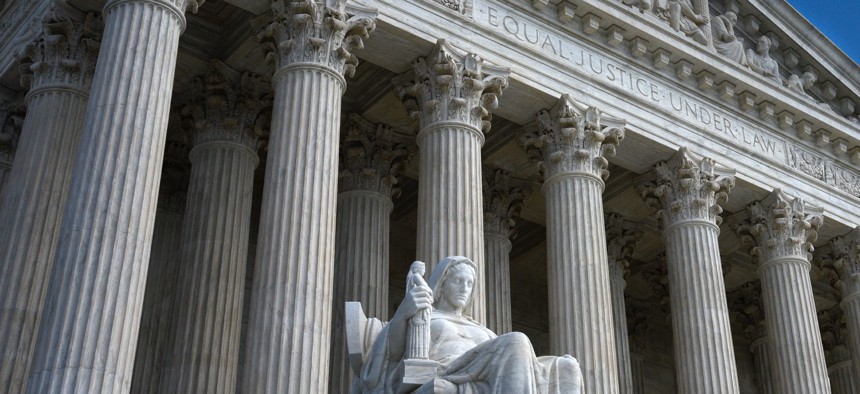
The Judicial Ethics Enforcement Act would require the Chief Justice of the Supreme Court to appoint an inspector general tasked with investigating claims of misconduct in the judiciary Robert Alexander / Getty Images
New bill would establish an IG for the Supreme Court
The Judicial Ethics Enforcement Act calls for a new inspector general’s office to investigate alleged misconduct and prevent waste, fraud and abuse across the judicial branch.
A new House bill introduced Friday seeks to establish a watchdog to oversee the highest court in the land.
The Judicial Ethics Enforcement Act — cosponsored by Rep. Melanie Stansbury, D-N.M. and backed by 10 other House Democrats — takes direct aim at recent scrutiny of Supreme Court justices’ ethics for ties to political donors and other controversies by calling of the creation of an office of the inspector general to monitor and audit the court.
“Americans have lost trust in the Supreme Court,” Stansbury said in a statement. “Strong judicial ethics are critical to a free and democratic society. We must safeguard these fundamental parts of American government to restore faith in our democracy and institutions. An inspector general will protect the Court from special interest groups looking to strip Americans of their rights in favor of their personal agendas.”
The Supreme Court adopted it first code of conduct in November 2023 following a series of ProPublica articles in April and June 2023 about Justices Clarence Thomas and Samuel Alito taking undisclosed trips with Republican donors and subsequent scrutiny of all nine justices.
The code of conduct calls on the justices to uphold the integrity and independence of the judiciary; avoid impropriety and the appearance of impropriety in all activities; perform the duties of office fairly, impartially and diligently, that they may engage in extrajudicial activities that are consistent with the obligations of the judicial office; and must refrain from political activity.
Stansbury’s bill would require the Chief Justice to appoint an IG, in consultation with House and Senate leaders, to at least a four-year term. The bill would task the IG with investigating alleged violations of the Supreme Court code of conduct and misconduct across the broader judicial branch.
The IG would also conduct audits and investigations into potential waste, fraud and abuse and make recommendations for possible changes to laws governing the judiciary. The IG would also have subpoena power to compel witness testimony, would make reports to the Chief Justice and Congress and possess a duty to inform the U.S. attorney general of potential criminal violations of federal law.
The bill is supported by Reps. Jamie Raskin, D-Md.-08, Ilhan Omar, D-Minn., Hank Johnson, D-Ga., Adam Schiff, D-Calif., Troy Carter, D-La., Jared Huffman, D-Calif., Betty McCollum, D-Minn., Eleanor Norton, D-D.C., Delia Ramirez, D-Ill., Jan Schakowsky, D-Ill., and Jill Tokuda, D-Hawaii.
The bill has been referred to the House Judiciary Committee.
A Senate companion bill co-sponsored by Sen. Richard Blumenthal, D-Conn. has support from Sens. Jeff Merkley, D-Ore., Mazie K. Hirono, D-Hawaii, Peter Welch, D-Vt., Ron Wyden, D-Ore., Sheldon Whitehouse, D-R.I., and Cory Booker, D-N.J.
“Like every other federal entity, the Judiciary needs an inspector general to deter and investigate internal wrongdoing — and restore public trust,” Blumenthal said in a statement. “After years of plummeting public confidence, the courts need a watchdog to do prompt, impartial investigations of alleged conflicts of interest, improper benefits or other potential wrongdoing. Any ethics rules or code of conduct requires public accountability — otherwise it’s dead letter — as the inspector general would provide.”
This is not the first attempt by congressional Democrats to administer ethics controls on the judiciary in the wake of recent controversy, but one of several bills introduced.
Whitehouse’s Supreme Court Ethics, Recusal, and Transparency Act advanced out of Senate committee last fall but never reached a floor vote. That bill called for ethical standards, financial disclosure requirements and recusal requirements.







